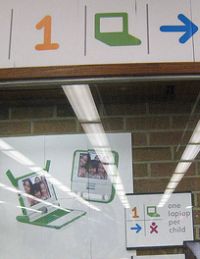I am Mita Williams from The Leddy Library at The University of Windsor in Ontario, Canada.
I had heard of the One Laptop Per Child program months ago but it wasn't until I heard fellow librarian Rochelle Mazar speak about how she used the project to engage students with the "issues of information access and activism" that I made the connection between the work of the OLPC and the professional work that many librarians are engaged in.
The connection that came to mind was not between libraries and formal development efforts (although there are organizations like eIFL.net and Librarians Without Borders that do this) but the work that libraries are currently contributing to on the "open" front: open source, open standards, and open access.
Libraries have many reasons why they should actively support open systems. There are concerns that "if the Kindle's DRM model becomes standard, you can kiss libraries goodbye . " Competing book digitization projects from Google and Microsoft mean that library content will be restricted by search engine choice.
Thankfully, there is the Internet Archive's Open Content Alliance that have partnered with (fellow) libraries like The University of Toronto to ensure that the world's treasures are available to all of the world.
Recently, I put up a library display on the OLPC and what it has to do with libraries. This sort of local outreach is important because even through our own university publishes a number of journals using the Open Journal System, there are still many faculty who aren't aware that they give up much of their own rights to re-distribute their own research once its published in a commercial research journal.
If the purchase of XO laptops are going to be at the expense of a developing country's textbook budget, then not only libraries have to make concerted efforts that every reader has his or her book.



I agree. I think the XO needs an Ebook activity that can be launched from the application bar and integrates a browser or other method to find and download books to the XO. Having to search through multiple repositories with multiple formats is very confusing even for moderately experienced users.
I couldn't agree more; the OLPC needs to partner with the various open content providers and Project Gutenberg and the like, and make its ebook mode powerful enough to trounce the Kindle and the Sony Reader. After playing with the Reader this weekend, if it just worked and had a fast page-turn time, it could win already.
The OLPC project is an educational project, but mostly because it works with free software an open standards. It is very important to free our containers in order to secure our collective access to more content.
I believe that Carlos Slim's education project will be placing XOs in Mexicn libraries, among other places. I am talking with Friends of African Village Libraries favl.org about the viability of these in places with no electricity. Right now they are in N. Ghana and Burkina Faso.
Most of the fragile publishing industry in Africa is about text books, and I don't see it being replaced by ebook readers any time soon. The infrastructure is not there, nor is the budget.
Steve Cisler wrote: "Most of the fragile publishing industry in Africa is about text books"
Which raises the question of whether etextbooks should be produced by locals for locals? Alternatively is it the case that local publication of textbooks has been killed off by globalisation and the effort that would have gone into producing textbooks can be more efficiently deployed on other activities? This is a question for all countries, not just developing countries.
I'm not going to pretend textbook publishing isn't a scam, at least in the USA. Still, academic content for children should be produced carefully, rigorously and objectively.
I agree (strongly) with the article's main thrust. Quality volunteer translations of books in open formats for use by libraries. It would be nice if Read and Write could use the Open Document Formats natively, but PDF and XHTML are better than nothing.
Librarians need to answer the old "censorship" questions before embracing open world. If they can't, then it just won't work.
I think, if you'll excuse me, they'd be a lot better off supporting the Lightbook, and Illumination.
Even if it's not open-source (for sound reasons which have nothing to do with money), every child in their country could indeed have one and, with it, a supply of thoroughly portable books from their local library . . .
Martin Woodhouse